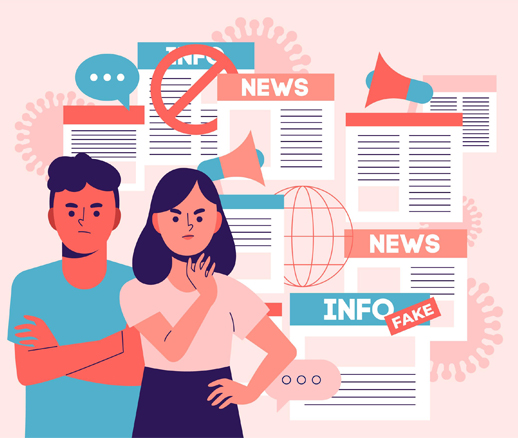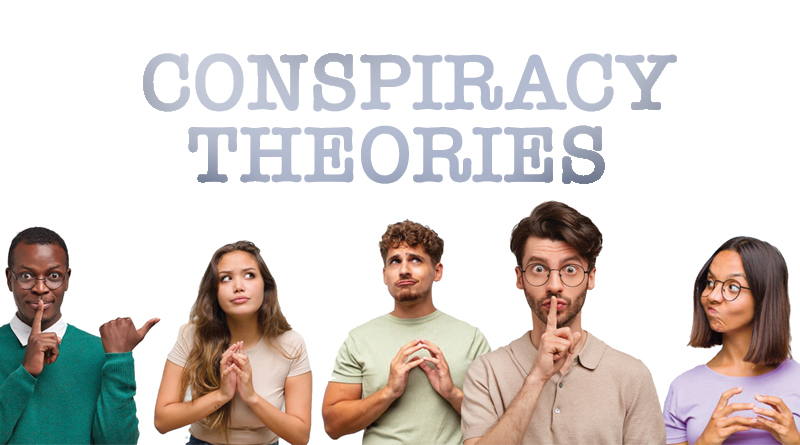Why do people believe in conspiracy theories?
Between good judgment and moderation
By: Diana Bello Aristizábal
In the midst of a pandemic, the world is simultaneously facing another problem: The overabundance of information or infodemic on the issues of greatest interest to the public. From this pile of articles that are spread on social media, websites, messaging apps, and printed articles emerge the so-called conspiracy theories that increase fears in an already overwhelmed society.
“A conspiracy theory is defined as an accusatory perception in which a small group of powerful people are secretly working for their own benefit and against the common good,” explains Joe Uscinski, associate professor of political science at the University of Miami and co-author of the book American Conspiracy Theories.
When this happens within certain scenarios of life, alternative versions to those officially known of highly relevant issues, such as vaccines, the coronavirus, or the presidential elections, emerge in the form of plots.
Although conspiracy theories have always been present, since March 2020, when the pandemic hit the whole world, they became stronger again. One of the most widespread conspiracy theories says the virus was created in a laboratory as a biological weapon against humanity.
Other widely spread theories include one that claims the US military took the virus to China, another one that says Bill Gates had prior knowledge of the pandemic and may have caused it, and one that states people who get vaccinated against COVID-19 will be embedded with a digital microchip to track and control them.
The effect of these plots, according to experts, is that they trigger fear and confusion in the population because of how widely spread they are. “We have a double pandemic: the pathological virus and the pandemic of fear,” Kang Liu, a professor at Duke University, said in an AP report.
 According to the psychologist and life coach, Sandra Arroyave, this situation is given when new events arise, such as the pandemic, and immediately pose a great challenge in each person. This leads individuals to seek information on several sources to try to understand the issue presented.
According to the psychologist and life coach, Sandra Arroyave, this situation is given when new events arise, such as the pandemic, and immediately pose a great challenge in each person. This leads individuals to seek information on several sources to try to understand the issue presented.
“The fear, stress, and uncertainty that comes with this process make these rumors grow bigger. People get unconsciously attached to the theories that resonate the most with their life environment, belief system, fears, and religious, political, and cultural context,” Arroyave says.
Joe Uscinski has a similar opinion, as he believes people tend to follow conspiracy theories that match their worldview. “Normally, they adopt theories that accuse those they already disapproved of before. In this way, a Republican can follow a theory that accuses Democrats and vice versa,” Uscinski says.
But the other repercussion of conspiracy theories is that they lead to actions that, at times, can be dangerous. “It is not an individual phenomenon because these motivate a collective action in which some people pass along their views to others,” says Sandra Arroyave.
In the face of this, we ask ourselves, how should we react and assimilate conspiracy theories to prevent them from causing harm in an already polarized world?
Question everything but avoid creating division
Sandra Arroyave shares that since the pandemic began, she has seen a significant increase in patients who come to her office with anxiety and stress because they are obsessed with different types of conspiracy theories.
“I have seen many people get carried away by fear to the point of ending their careers, go into a depression state or stop going out because they are afraid any of the theories turn out to be true,” she says.
Arroyave recommends, instead, working on the emotions an event creates. “If you’re afraid of dying from the coronavirus, for example, document yourself, compare data, find out where the information comes from, ask yourself what is happening inside of you that makes you sensitive to external ideas and think if it’s worth not having peace of mind in exchange for following these theories.”
In addition, before sharing any information, it is key to ask yourself what is the motivation to do so. “Are you sharing it as an opinion, a confirmed fact, or from your fears?” Arroyave says.
On the other hand, it’s important to avoid creating division when others share their opinions or claim to believe in a conspiracy theory since social media and the physical world have become a battlefield where no one seems to respect the point of view of others. Listening without judgment or confrontation can be a starting point.
Jairo Ricardo Ledezma, professor of history and sociology at Miami-Dade College, advices to find out what are the motivations behind the person or organization that shares a conspiracy theory. “A vital question to ask ourselves is: what reaction is expected from me with this, or why do they want me to believe this? Many times we discover that there are political or economic interests behind it.”
Also, he suggests when in doubt, always refer to the expert on the matter. “If you are going to fix your car, you take it to the mechanic, not to a bakery in the same way you cannot believe something just because it comes from your mother-in-law or a friend,” he explains.
Therefore, you have to question everything and do the task of verifying whether a theory is proven or not. According to Ledezma, when something is not a conspiracy theory but a real fact, it is massively confirmed by experts from official institutions in different countries of the world who get to similar conclusions on a subject.
“If we want to improve as humanity and stop this saturation of information that is doing us so much harm, we must always ask ourselves ‘what other sources have said the same?’ before sharing and spreading pieces of information,” Ledezma states.

